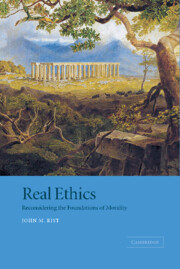Book contents
- Frontmatter
- Contents
- Acknowledgements
- Introduction: Ethical crises old and new
- 1 Moral nihilism: Socrates vs. Thrasymachus
- 2 Morals and metaphysics
- 3 The soul and the self
- 4 Division and its remedies
- 5 Rules and applications
- 6 The past, present and future of practical reasoning
- 7 Autonomy and choice
- 8 Ethics and ideology
- 9 God and ethics
- Bibliography
- Index
1 - Moral nihilism: Socrates vs. Thrasymachus
Published online by Cambridge University Press: 16 January 2010
- Frontmatter
- Contents
- Acknowledgements
- Introduction: Ethical crises old and new
- 1 Moral nihilism: Socrates vs. Thrasymachus
- 2 Morals and metaphysics
- 3 The soul and the self
- 4 Division and its remedies
- 5 Rules and applications
- 6 The past, present and future of practical reasoning
- 7 Autonomy and choice
- 8 Ethics and ideology
- 9 God and ethics
- Bibliography
- Index
Summary
The raw material of ethical reflection is provided by human behaviour as we experience and observe it and as it is recorded directly by historians, journalists, TV cameramen and film-makers, writers and, less directly, by other sorts of ‘creative’ artists. An argument might be developed that it is preferable that such people not be philosophers, for the more philosophical they are, the more they are likely to overlay their observations with theory, and theories have a way of bending facts to their own convenience. A possible reply would be that a philosopher might approach historical or descriptive writing more conscious of such dangers, and thus take more precautions to be dispassionate.
Many people believe that it is vain to hope to produce narratives of the past or present unburdened by theory, and thus conclude that the only significant difference between the ‘philosophical’ observer and his lay counterpart is that the former will produce more self-conscious, more sophisticated and even novel theories with which to wrap up the ‘facts’, while the latter is more likely to reproduce the ‘ordinary’ prejudices of his time. Such a conclusion is premature and simplistic. While the historian or other direct assembler and assessor of the raw material of ethical enquiry cannot entirely avoid a limited and personal point of view (though he can certainly avoid crude propaganda), the literary artist, especially the tragedian, is able to present moral dilemmas the more poignantly – or the more unfairly – since he enjoys the luxury of not having to argue, or even perhaps insinuate, any resolution in moral terms; he need only describe an example of human chaos, perhaps from different perspectives, thereby evoking our sympathy, hatred or contempt, though not always our rational judgement.
- Type
- Chapter
- Information
- Real EthicsReconsidering the Foundations of Morality, pp. 10 - 26Publisher: Cambridge University PressPrint publication year: 2001



